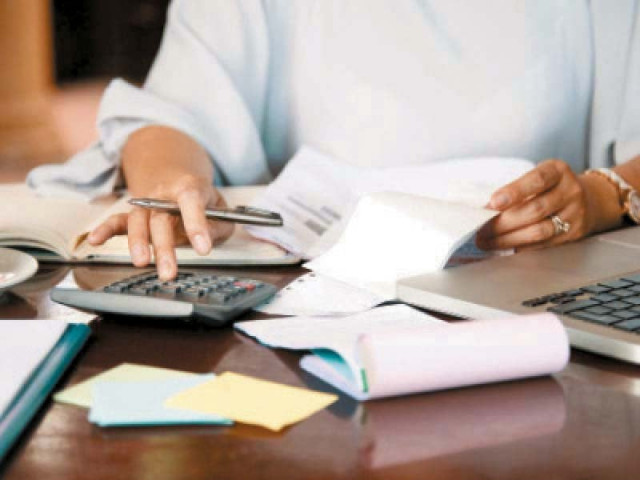T-bill returns hit 24-year high
Govt raises Rs614b through auctioning treasury bills to commercial banks

Pakistan’s financial markets maintained record breaking spree, as commercial banks’ lending rate on financing to the cash-strapped government for a period of six-month hit 24-year high at 14.99% on Wednesday.
The government raised a total of Rs614 billion through auctioning three, six and 12-month T-bills to commercial banks against a set target of Rs500 billion, according to the State Bank of Pakistan (SBP). “The cut-off yields (lending rate) on T-bills have maintained uptrend on the outlook that inflationary pressure will spike in the short-run … and demand for financing from government will remain high,” Arif Habib Limited (AHL) Head of Research Tahir Abbas said while talking to The Express Tribune.
The cut-off yields on six-month T-bills surged 114 basis points to 14.99%. “This is the highest ever lending rate since 1998.”
A day ago on Tuesday, the six-month Kibor (Karachi inter-bank offered rate) – the rate at which banks offer financing to other banks – soared to a record 13-year high at 14.10%.
The yields on T-bills usually remain high compared to inflation reading in the country.
The inflation is estimated to spike to 15-15.5% in the months to come, as the government is considering rolling back subsidies from petroleum products and power prices to win back the International Monetary Fund (IMF) enhanced loan package of $8 billion. The IMF team is scheduled to visit Pakistan next month in May.
The government’s demand for financing from commercial banks is estimated to remain high, as it needs a significant amount of financing to overcome budgetary shortfall. Finance Minister Miftah Ismail has anticipated the fiscal deficit soaring to Rs6.4 trillion (almost 10% of GDP) in the current fiscal year 2022. “This is a significantly higher number for borrowing from domestic commercial banks,” Abbas said. “We (AHL house) projects the fiscal deficit at around Rs4 trillion (7% of GDP) for FY22,” he said, adding the deficit came at Rs2.5 trillion in the first nine (Jul-Mar) FY22.
Read Bears take centre stage at PSX
BMA Capital Executive Director Saad Hashmey said the government demand for financing from commercial banks spiked after it was barred from borrowing from the central bank through recent legislation and under IMF conditions.
“The situation partially supported commercial banks to charge a higher interest rate on lending to the government.” Secondly, a significant depletion in the country’s foreign exchange reserves in recent months also spiked demand for local financing. “Reduction in foreign currency inflows has created a liquidity crunch in the domestic economy. Therefore, demand for domestic borrowing has shot up,” he said.
The cut-off yields on T-bills would start reducing following inflation-reading starts improving and foreign currency inflows enhance into the country, he said.
Abbas said inflation would spike to 15-15.5% during two to three months around May-August 2022. “The inflation will start reducing from September-October onwards.”
He said that the central bank is projected to increase the benchmark interest rate by 100 basis points to 14.25% on May 23. Earlier, the bank increased the rate by a massive 250 basis points to two-year high at 13.25% in an emergency meeting (held on April 7) to control inflation and improve current account deficit. The expected another increase in the key policy rate by the central bank would help it control higher inflation, he said.
The yields on three-month T-bill increased 129 basis points to 14.79%, while it hiked 96 basis points to 14.80%.
Banks had offered Rs708 billion to the government in the auction. The government was scheduled to repay maturing debt worth Rs343 billion to banks on Tuesday.
Read more Market watch: Stocks drop again in absence of positivity
The borrowing breakup suggests, the government raised Rs320 billion against a set target of Rs200 billion against auction of three-month T-bill.
It borrowed Rs135 billion against a set target of Rs200 through six-month T-bill. It acquired Rs160 billion against a target of Rs100 billion through selling 12-month T-bill papers to commercial banks in the latest auction.
Earlier this month, the Oil and Gas Regulatory Authority (Ogra) has proposed to increase petrol and diesel prices by Rs83.50 per litre and Rs119.88 per litre, respectively, to pass on surge in international oil prices and charge petroleum levy at Rs30 and 17% GST per litre.
Prior to this, the ousted PTI government reduced the petroleum products prices by Rs10 per litre on February 28 and fixed petrol at Rs149.86 per litre and diesel at Rs144.15 till June 30, 2022. Besides, it reduced the power tariff by Rs5 per unit. The prices have remained unchanged to date since then.
Published in The Express Tribune, April 28th, 2022.
Like Business on Facebook, follow @TribuneBiz on Twitter to stay informed and join in the conversation.



















COMMENTS
Comments are moderated and generally will be posted if they are on-topic and not abusive.
For more information, please see our Comments FAQ